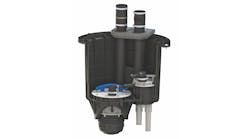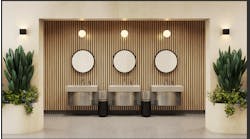NO ONE ADVOCATES water conservation more than I do, but here’s where I draw the line: Guys who don’t flush the urinal or toilet after they visit a public restroom.
Our report this month on “green restrooms” identifies water usage as the most significant environmental issue in public lavatories, and most of the water used in men’s rooms is flushed down the drains of urinals and toilets. So, maybe the non-flushers whom I always seem to follow into restrooms are just doing their part to help the environment.
In fact, some of these conservationists take saving water so seriously that they also skip the next step of running water in the sink on their way out the men’s room door. This practice is confirmed in our green restroom report as well by the startling study that reveals only 67% wash their hands after going to the bathroom, although 95% say that they do.
Yet, while I can applaud the end result of saving water, I am even happier there are other means to that end that are less unsightly, smell better and promote better hygiene. Technology, backed by government mandates, has given building owners the power to take the decision to conserve water literally out of the hands of non-flushers.
It’s up to you, as contractors, to make sure that your customers know that this equipment can save them money as it conserves water. Further, only you can install these products properly so that they function as intended and people can feel good about using them.
While it’s common for businesspeople to grouse about regulations, the fact is that federal, state and local governments have provided contractors in recent years with new business opportunities as they try to help the environment. I wrote an editorial almost nine years ago that quoted an incoming president of a major contractors association who called the government a “contractor’s best friend” in creating jobs related to water conservation and clean air.
And, there’s no reason to be cynical about these types of jobs. Conserving water for today’s population and the generations to come is a worthy objective for us all to pursue. It’s just that plumbing contractors are in a better position than the rest of us to put many water-saving concepts into actual practice.
Regulations that mandate low-flow urinals and toilets already are saving billions of gallons of water a year, according to our report. A huge opportunity to save water — and to create jobs — can be found in bringing public restrooms in existing buildings up to current water conservation standards. Replacing older toilets in a typical office building with low-flow models could save up to 4,000 gal. per fixture per year.
Behind the water-saving fixtures and faucets lie other opportunities for plumbing and piping contractors who install non-potable water systems that use treated wastewater. We published a front-page story two years ago on just such a system in Cary, N.C., which uses reclaimed wastewater for non-potable purposes such as lawn irrigation. In July, I visited the Cary facility with the story’s author, columnist H. Kent Craig.
This month, our report by Alex Wilson of BuildingGreen Inc. cites a 1997 California law that encourages dual plumbing systems in many types of nonresidential buildings so that treated wastewater can be used for toilet and urinal flushing. The law also permits a public agency to mandate the use of treated wastewater for such uses when deemed appropriate. By 2010, this law is expected to have saved the state 1 million acre-feet of water.
Beyond what governments have put into law, technology has created other opportunities to save water. Electronic sensors for faucets, toilets and urinals can deliver real water-saving advantages over manual models. The hands-free technology may have been developed with better hygiene in mind, but these products can help the environment too.
At the same time, this water-serving technology can provide you with business opportunities as you save your customers money on their water bills. Updating commercial and institutional restrooms with green plumbing products is worth investigating, especially if you’re mired in a struggling nonresidential building market.

